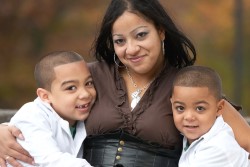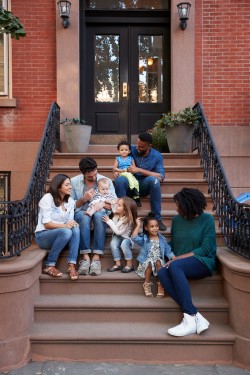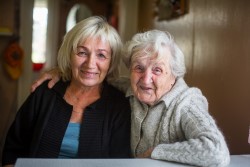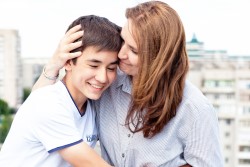
CDRCs help individuals, families, and communities in many types of situations.
Parenting Plans and Child Support
 CDRCs help separated parents make their own plans for how they will raise their children. CDRCs help parents and grandparents talk about:
CDRCs help separated parents make their own plans for how they will raise their children. CDRCs help parents and grandparents talk about:
• how to share parenting time with each other (parenting plans), and
• how to handle child support responsibilities.
 CDRC services have been shown to improve communication between co-parents and support collaborative relationships that positively impact children.
CDRC services have been shown to improve communication between co-parents and support collaborative relationships that positively impact children.
Families can use CDRC services whether or not they have a case in court. NYS Unified Court System funds CDRCs to provide free and low-cost services for families.
“The mediation really helped in opening the lines of communication between my children's father and me. The mediators were skilled, compassionate and able to diffuse moments of tension. They helped to point out areas of agreement that we can build upon and said things that emphasized . . . having our kids' best interests at heart.”
--Custody and Parenting Plan client from Common Ground
“This was my first time ever going to family court and I was unaware of the mediation services. I did not think that my ex and I would ever be able to come to an agreement. Mediation saved us both, and our child, a lot of pain, time, and money. I had many tears of relief at the end of mediation and was shocked that we were able to get there. Mediation is a blessing to families.”
--Custody and Parenting Plan client from the Center for Resolution and Justice
Housing Services
 CDRCs are a crucial resource in resolving housing disputes, so that:
CDRCs are a crucial resource in resolving housing disputes, so that:
• landlords can receive predictable income, and
• communities can reduce homelessness.
The most commonly mediated situations include:
• evictions,
• roommate and holder issues,
• property repair and maintenance, and
• security deposits.
Tenants or landlords can request CDRC services whether or not they have a case in court. Unified Court System funds CDRCs to provide free and low-cost services.
“They were great! Thank you for this service; we are very grateful for the assistance we received.”
--Housing Services client from Catholic Charities Dispute Resolution Center in Montgomery County
Financial and Contractual Disputes
 CDRCs often help people resolve financial and contractual disputes. CDRC mediators help people discuss issues such as:
CDRCs often help people resolve financial and contractual disputes. CDRC mediators help people discuss issues such as:
• car and equipment loans,
• unpaid bills,
• third party loans,
• damaged property, and
• concerns about the quality of repairs or other services.
These cases typically involve consumers and merchants, but may also involve friends, family members, or neighbors whose relationships are strained by a financial dispute.
People can request CDRC services whether or not they have a case in court. NYS Unified Court System funds CDRCs to provide free and low-cost mediation services.
“I am very glad that I asked for mediation. I am glad I was able to use a process that was less contentious, less expensive, and highly successful.”
–Financial Mediation client from Mediation Matters
“It went as well as I could have expected and I thought they did an excellent job explaining the role of mediation, neutrality, confidentiality, and really helped to settle the claim.”
--Attorney representing a Financial Mediation client from the Center for Resolution and Justice
Other Family Issues
 CDRCs provide an environment that encourage cooperative relationships for families facing difficult decisions or life transitions. CDRCs can help families address:
CDRCs provide an environment that encourage cooperative relationships for families facing difficult decisions or life transitions. CDRCs can help families address:
Parent-Child Disputes - hosting a conversation between a young person and a parent to help repair a strained relationship. Families often discuss household responsibilities, behaviors, curfews, school attendance, and mutually respectful communication. Learn more about CDRC services for youth and families.
Divorce - facilitating challenging decisions about raising children, dividing property and other assets, and determining child and spousal support.

Elder Adult Dialogue- assisting a family in discussing the care of an elderly family member. Families can discuss options for health care, legal and fiscal matters, and living arrangements, while supporting and maintaining important relationships.
Contested Wills- supporting families who are grieving the death of a loved one while also disagreeing about inheritances and the execution of a will.
People can request CDRC services whether or not they have a case in court. NYS Unified Court System funds CDRCs to provide free and low-cost mediation services.
“The mediation process was really wonderful. I highly recommend it to others.”
–Divorce Mediation client from Center for Dispute Settlement
“This being my first time in a situation like this, and zooming from Florida in the Westchester courtroom, I had two . . . experienced, caring, efficient, and nonpartisan mediators. They made this long-distance experience, for this first-time mediation client, a nice experience under the circumstances!”
–a Contested Wills client from Westchester and Rockland Mediation Centers of CLUSTER
Juvenile Justice
 CDRCs assist youth to build strong, positive connections in their communities. CDRCs work in collaboration with Departments of Social Services, Probation Departments, courts, and law enforcement to provide Restorative Justice-based Programming for youth who have committed criminal offenses. By participating in these programs, youthful offenders learn how their actions have harmed others, find ways they can repair the harm they have done, and develop skills that contribute to the well-being of their communities. Learn more about CDRC services for youth and families.
CDRCs assist youth to build strong, positive connections in their communities. CDRCs work in collaboration with Departments of Social Services, Probation Departments, courts, and law enforcement to provide Restorative Justice-based Programming for youth who have committed criminal offenses. By participating in these programs, youthful offenders learn how their actions have harmed others, find ways they can repair the harm they have done, and develop skills that contribute to the well-being of their communities. Learn more about CDRC services for youth and families.
School-based Services
 CDRC services address school discipline issues, promote positive school climate, and support the social-emotional wellbeing of students.
CDRC services address school discipline issues, promote positive school climate, and support the social-emotional wellbeing of students.
• Training for School Staff and Teachers - teaching students, teachers, and school administrators the conflict management techniques needed to have more supportive learning environment.
• Peer Mediation - training students to resolve disagreements and tension among their school mates and between students and teachers.
• School-based Restorative Justice Implementation - guiding schools in implementing restorative practices to improve school climate and decrease reliance on punitive discipline strategies.
• School Attendance Services - helping students, families, and school staff develop plans for reducing student absenteeism.
 CDRCs provide several different conflict resolution methods including mediation, conflict coaching, restorative justice, arbitration, and large group dialogue. Learn more about these methods and services.
CDRCs provide several different conflict resolution methods including mediation, conflict coaching, restorative justice, arbitration, and large group dialogue. Learn more about these methods and services.
